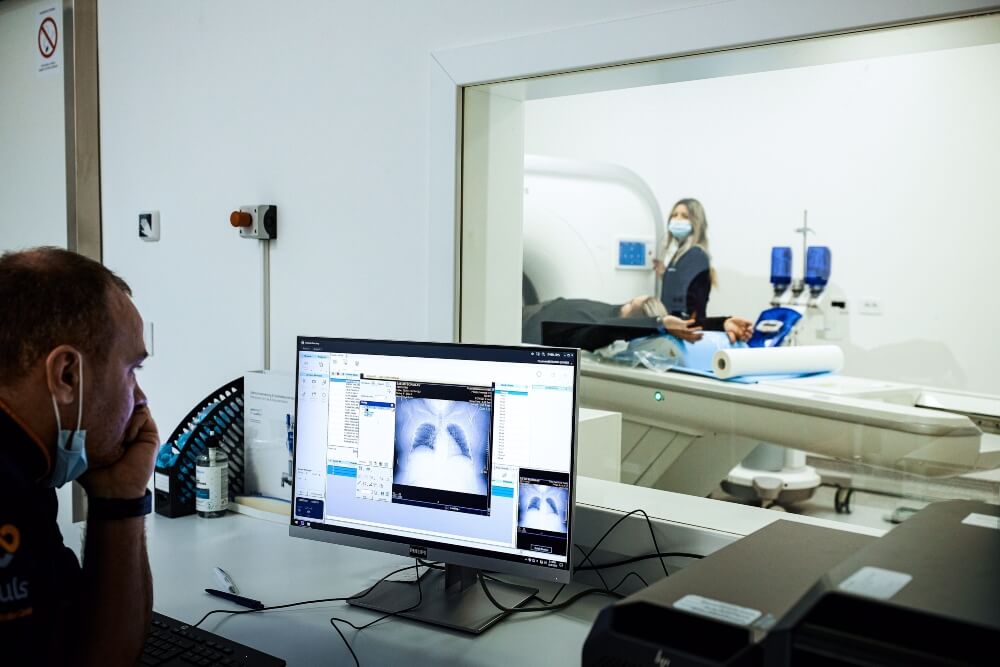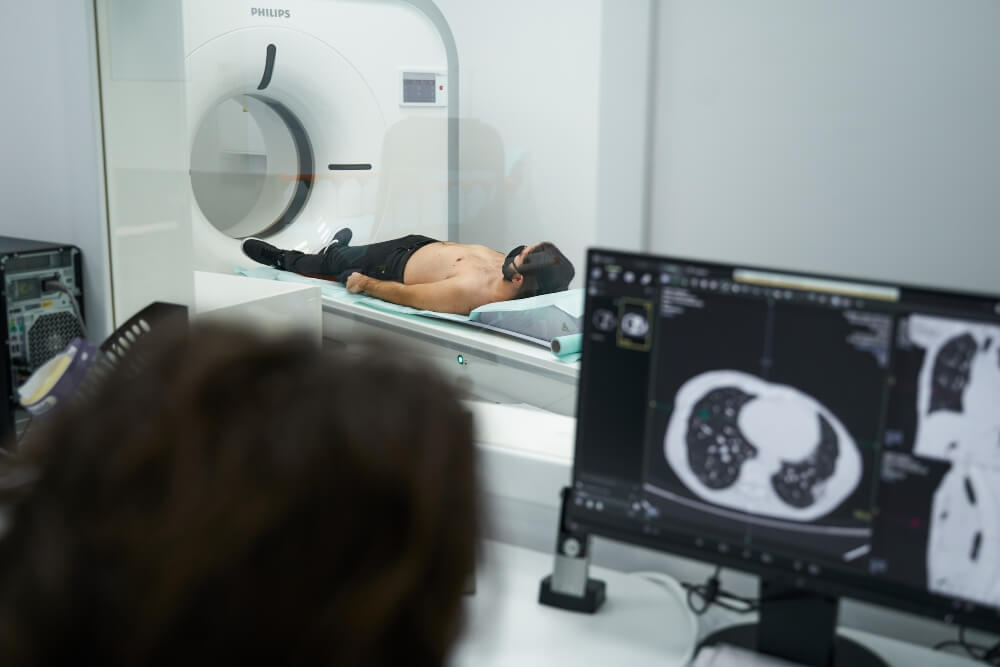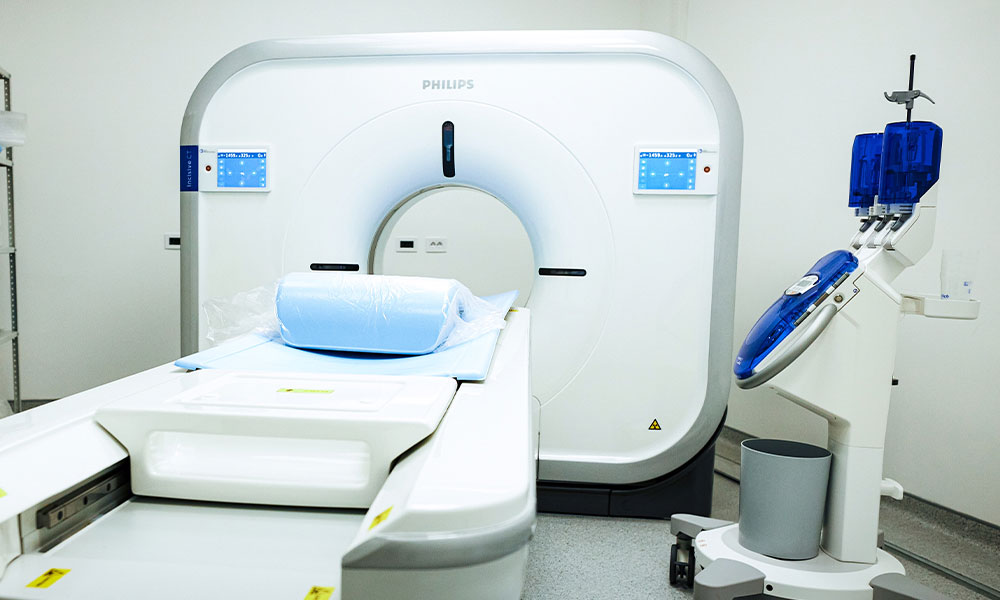What Is Computed Tomography (CT)?
MSCT (multi-slice computed tomography) is a modern technique that allows layered body imaging. Unlike CT, MSCT radiation is detected in multiple detectors so the results are extremely accurate which is very important for fast and timely diagnostic.
Pulse Cardiology Center has a 128 multi-slice Incisive CT Philips scan which can be used for:
- CT of the heart (it is recommended to patients in order to determine the risk of heart disease, but also to the patients who are in the process of treatment so the doctor can monitor therapy efficacy)
- CT calcium scoring ( used to determine the presence, position, and girth of calcified plaque in the coronary arteries)
- CT scan of the lungs (used to detect changes in the lungs such as inflammation, nodes, or cancers, and it can detect them even at the earliest stages)
- CT of the aorta (used to diagnose problems with blood flow through the aorta)
- CT scan of the spine (used to detect diseases and problems of vertebrae and other spinal structures and tissues)
- CT scan of the joints (used to identify problems such as tumors, injuries, fractures..Only the joint/joints which is problematic is scanned, so the exposition to radiation is minimal)
- CT scan of the abdomen and pelvis (used to detect injuries and changes in these areas, but it can also be used for monitoring the efficacy of tumor therapy as well as the guide for biopsy of tumors)
- CT head scan (important for detection of causes for dizziness, severe headaches, as well as for the detection and diagnosing aneurysms, bleeding, tumors or strokes)
- CT urography
- CT coronarography
- CT angiography – CTA
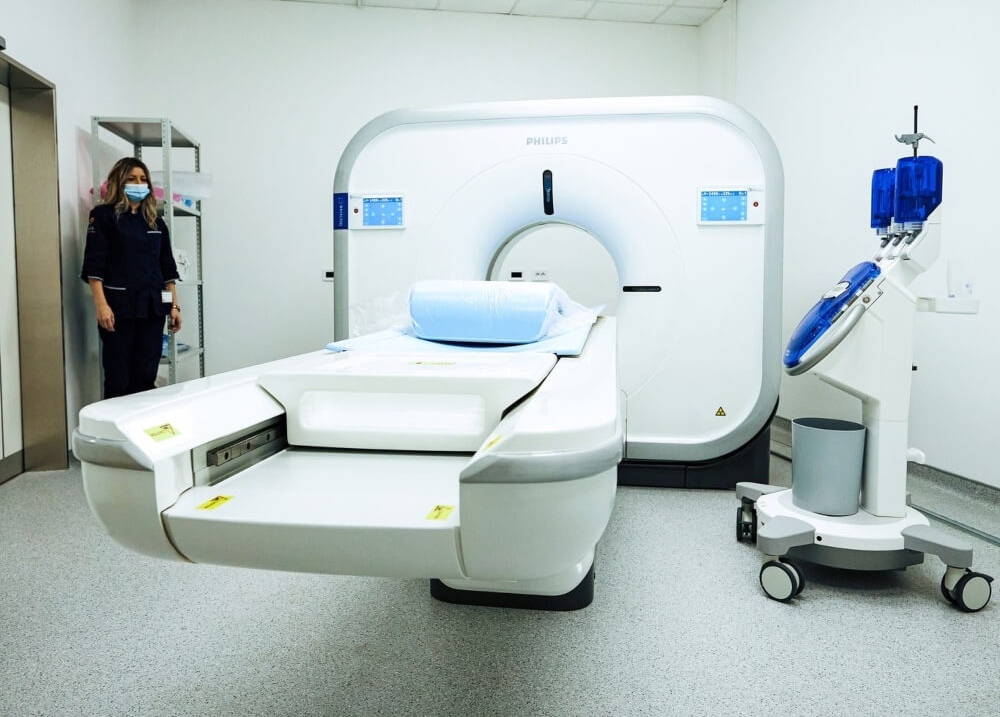
What Does a CT Scan Looks Like?
CT scan usually looks like a tube or a tunnel, which has openings on both sides. Our CT machine is a little bit different because instead of a tube, the patient goes through a ring-shaped orifice, which is more open than usual CT machines, so it’s suitable for claustrophobic patients. The patient lies on his back on a bed which is pulled into the machine.
Even though our CT scan is more opened than others some patients can still be uncomfortable or feel claustrophobic, but experts in our clinic are always there to talk with them and calm them. In order to get good quality images, it is very important that the patient lays still during the examination, and sometimes if the doctor deems it necessary the patient can get a mild sedative.
During the examination, the patient is alone in the room, but he can communicate via intercom with the doctors, so at any moment he can tell the doctors if he needs anything or to ask for some assistance.
The duration of the examination depends on the region which is examined and the doctor is going to inform you beforehand.
It’s important for you to know that the value of information that doctors get from computed tomography is very valuable and overpowers any discomfort that you may experience because of the appearance of the machine or its noise.
Shortly after the CT scan, you will have the results since the radiologist is there to right away interpret your scan.
Why Is a CT Scan Performed?
As we already mentioned CT scan has a significant role in diagnosing a wide range of diseases such as: tumors, fractures, infections, apsces, hematomas. It’s also important in detecting internal injuries or haemorrhage. It’s also very useful in monitoring the effects of the treatments.
How Should You Prepare for CT?
Preparing for the CT scan is not complicated nor too demanding.
It’s is important that you tell the doctor if you have any allergies, because for some examinations you need to get contrast (dye), and in some cases, you can get an allergic reaction to contrast because it contains iodine.
Before the examination urea and creatinine test should be done, which will show if your kidneys work well. This is important because if your kidneys don’t work well the contrast can’t be excreted and some other form of diagnostic will be recommended.
A few hours before the examination you should avoid taking food or drinks, and before you lay in the CT you should remove jewelry, glasses, dentures because the metal in them can interfere with the scan.
When Is the Contrast Used?
Contrast is used in some types of examination when it’s difficult to distinguish the structures that doctors want to examine from other structures in the body.
It can be applied in various ways: oral, intravenous, or rectal, depending on which organ is targeted.
If you need to do a CT scan of the esophagus or stomach then you would drink the contrast. If you need to do a CT scan of blood vessels, urinary track, gallbladder or liver than the contrast will be injected intravenously. For examination of the rectum, the contrast needs to be aplied directly into the rectum.
The contrast doesnt’t taste good, so it may be uncomfortable swallowing it and even when injected intravenously you can feel a metal taste in the mouth, besides the feeling of warmth passing through the body.
How Should You Behave After the CT Scan Is Done?
After the examination, you can return to your normal daily activities, only if the contrast was applied you should increase water intake, so the dye could leave your body as soon as possible.
Is CT Scan Safe?
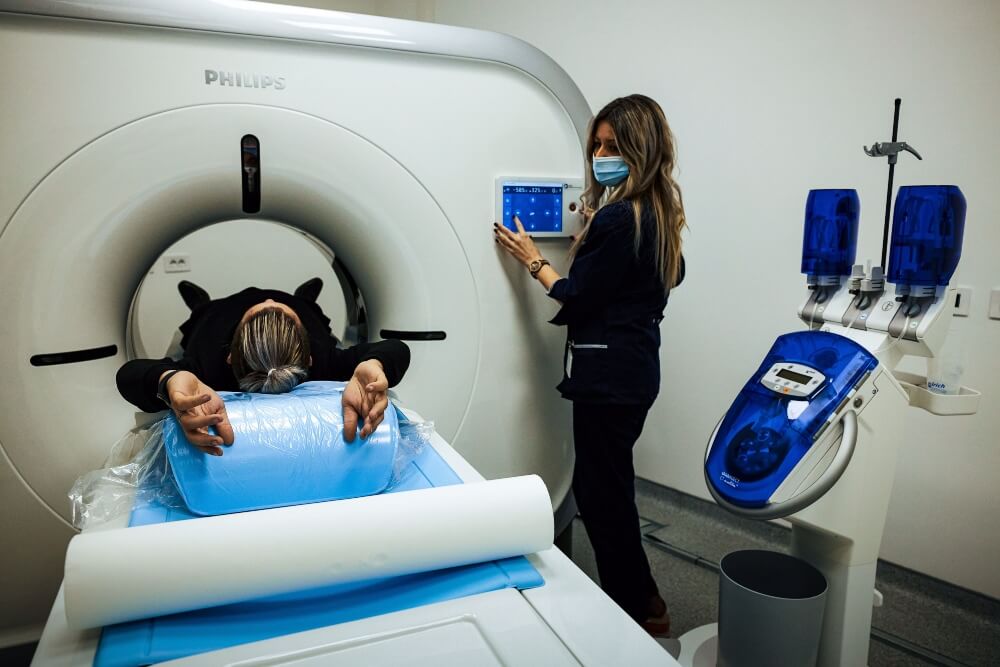
Computed tomography is a completely painless diagnostic method and it is highly reliable. Also, it is highly beneficial that you get the results fast since right after the examination radiologist interprets scans.
If you are worried about radiation during a CT scan, you should know that doses of radiation aren’t high and shouldn’t endanger your health. The doses of radiation are strictly monitored, and the duration of examination is only long as needed. Besides that, usually, you are not going to repeat the CT scan that much, so exposure to the radiation shouldn’t increase the risk for cancer.
You need to tell the radiologist if you are pregnant or suspect that you are. Another method may be recommended, which is also an appropriate situation, the risk to the fetus even lower.
CT scan allows experts to detect even the slightest changes in your body at the earliest stages of the disease, which significantly affects the quality of the treatment process, its length, and efficacy.
You will be recommended a CT scan if you have increased risk for some disease that can be detected with this examination if you have certain symptoms that are typical for some diseases if you have some internal injuries that are best examined with a CT scan, or in order to monitor the effects of treatment.
If you need a full-body scan or imaging of certain parts then our facility is the right place for you. Thanks to the modern technology we use and our trained experts your results will be expertly interpreted and explained, after which you will receive advice for further treatment, if necessary.

